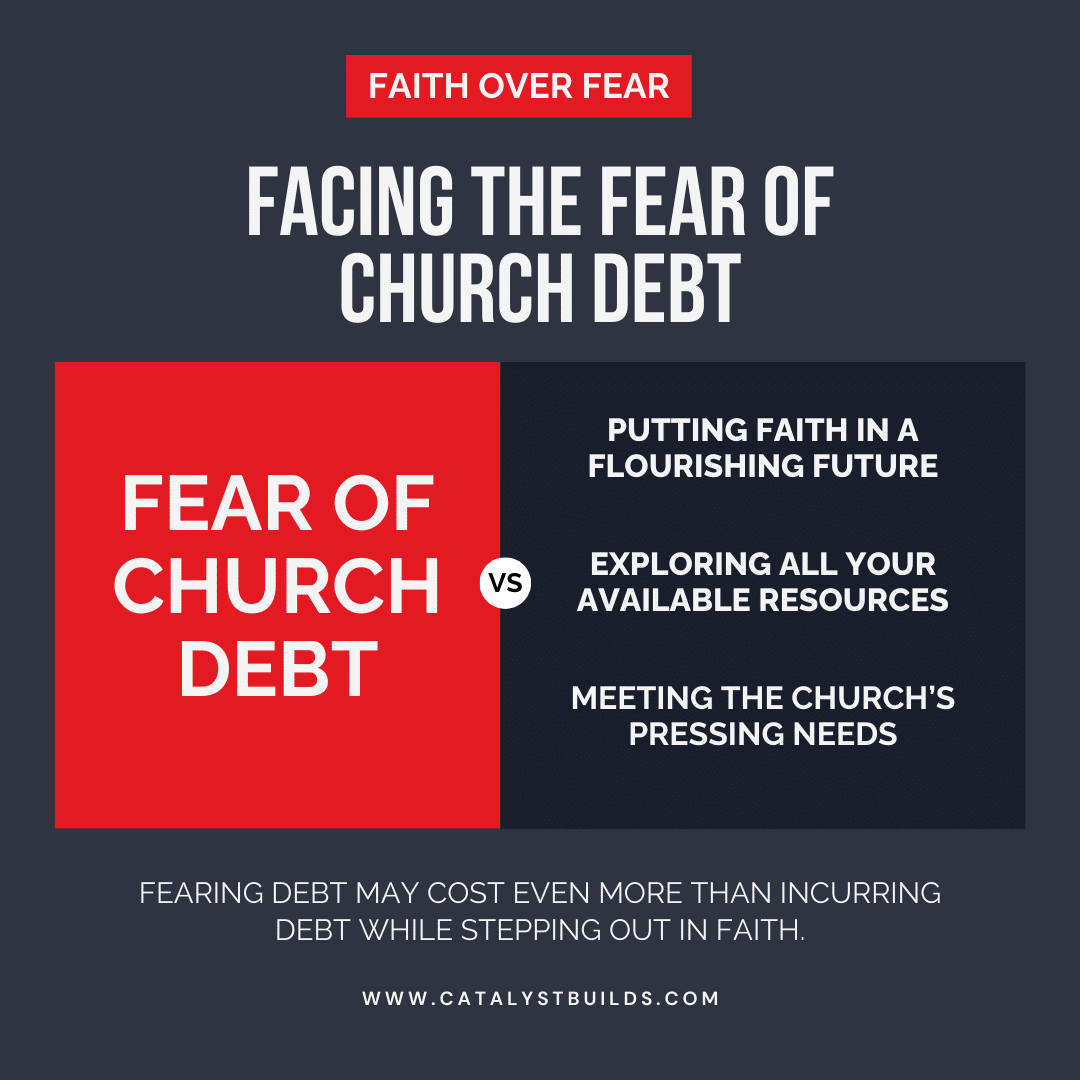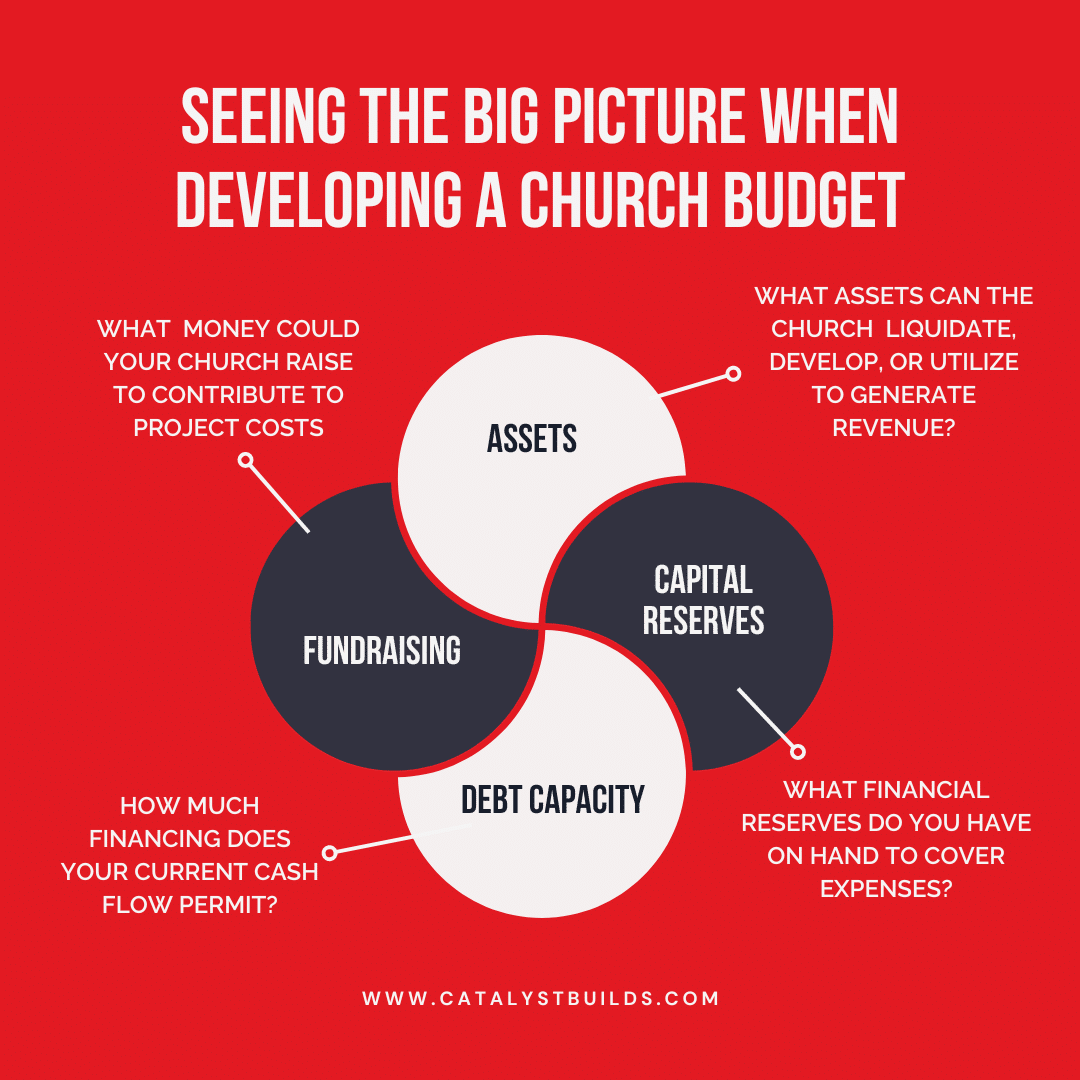Debt is a four-letter word – literally. But is it that kind of four-letter word? Debt can send your anxiety through the roof. Just watch the US Debt skyrocket at usdebtclock.org. You could also listen to politicians debate the merits of student debt relief.
In this cultural moment, it’s hard to see debt as anything other than bad or foolish.
But is debt always bad?
Is all debt bad?
Should debt be avoided at all costs?
The pressure of going into debt is amplified when applied to the church. Spiritual dynamics must be factored in. Multiple people are involved. A community is watching. Future generations will be impacted.
Can you successfully complete a church construction project without incurring church debt? Should you? What issues might be created if you don’t take on church debt?
Face the Fear of Church Debt
No church should take on debt simply because it’s available. The housing crash of 2008 made that painfully clear. The Bible warns against incurring foolish debt:
“The rich rule over the poor, and the borrower is slave to the lender.” – Proverbs 22:7
There’s no way around it. If you borrow money, you pay for it. But you may also pay for the money you don’t borrow. Fearing debt may cost even more than incurring debt while stepping out in faith. Consider the following:
- Fear of church debt VS faith in a flourishing future
- Fear of church debt VS exploring all available resources
- Fear of church debt VS meeting pressing needs
Church debt can become problematic. But so can church savings. Did you know the Bible warns against borrowing AND hoarding resources?
“There is a grievous evil that I have seen under the sun: riches were kept by their owner to his hurt.” – Ecclesiastes 5:13.
Money can be spent, saved, or borrowed out of fear OR faith. If you’re wondering if you can complete a church construction project without any church debt, you must ask – why? Why do you want to avoid church debt? Is your question driven by fear or faith?
Should Church Debt be Avoided in Church Construction Projects?
The less church debt you take on, the better. However, if you try to avoid church debt when engaging in a church construction project, you may avoid the church construction project altogether!
Debt is not a four-letter word to be avoided. It’s a resource to be considered. If you’re ready to take on a church construction project, church debt is one of the four primary resources at your disposal.
A comprehensive church construction company will help you see the big picture when developing your budget.
- Assets: What assets does your church have that could be liquidated, developed, or utilized to generate revenue?
- Capital Reserves: What level of financial reserves do you have on hand to cover expenses?
- Fundraising: What amount of money could your church raise to contribute to project costs?
- Debt Capacity: How much financing does your current cash flow permit?
Church debt is one part of a bigger financial picture that can fuel your dreams and empower you to step into the future with faith.
When Should You Avoid Church Debt?
If you haven’t explored the funding mechanisms available, you should avoid incurring church debt. There are creative ways to generate revenue; debt is only one piece of the puzzle.
A second reason to avoid debt is if you don’t have positive cash flow. Living beyond your means is not wise for a person, family, or church. The church debt you take on should not exceed the amount you can afford to pay.
Church building projects are defining moments in a church’s life. Engaging in a church construction project will set the trajectory for your future. You must be certain that a building project will actually solve the problems you are facing.
There are some needs a building project won’t meet. Consider the following.
- We need to grow. Seeing a new building going up may generate some excitement in the community. However, “if you build it, they will come,” only works in the movies. If your church is not growing, a new building or expanded building will not likely solve that problem.
- We need to keep up. No church should spend money it doesn’t have to buy things it doesn’t need. Your church should be true to its values—not those of other churches.
- We need to evolve. There is a difference between core values and aspirational values. You should not incur church debt to become something you are not. Church construction projects should amplify your values, not shift them.
Don’t add debt you can’t afford. Don’t go into debt without exploring alternative avenues for generating revenue. Don’t hang debt on your shoulders by hanging your hope on a building project.
How Church Debt Can Expand Your Ministry and Enhance Your Future?
Church debt, when used strategically, can be the fuel you need to launch your church to new heights. It expands your capacity for ministry and demonstrates faith in a thriving future.
You may be surprised to learn that many churches with full savings accounts – are in decline. Conversely, in our experience, most growing churches carry some debt.
Why?
Vision. Faith. Momentum. Boldness.
Churches with a God-sized vision that resonates with their community’s deep needs often need to increase their ministry capacity. To accomplish this, they are willing to take on some church debt.
They don’t take on debt as a strategy but as part of a solution to better serve their community. Here are several indicators your church is ready to step out in faith and consider taking on strategic debt.
- Solving meaningful, missional problems. A bigger building for the sake of new amenities isn’t inspiring. But expanded space to accommodate growth and better serve your neighbors – that’s a God-sized dream people can get behind.
- Matching core values. When the dreams God has given your church have outgrown your current facility – taking on debt to expand your space will be an obvious and inspiring step to take.
- Setting up future generations for success. Church debt means you believe the coming generations will not only need the space you build, but they’ll also be able to fund it. Church debt can demonstrate that you believe the next generation will continue and deepen your church’s legacy.
Get Church Debt Working for You!
Church debt is neither a lifebuoy nor an anchor. It’s one piece of a larger puzzle. If approached strategically, church debt can empower your congregation to maximize its potential.
You don’t have to go on this journey alone. We would be honored to walk with you. For over 17 years, we’ve guided hundreds of churches through their church construction process. We can help you, too.
Our team of experts has comprehensive solutions for every step of your journey. From fundraising to groundbreaking to getting the project to the finish line – we can walk with you!
Ready to get started? Reach out today for a free consultation!







